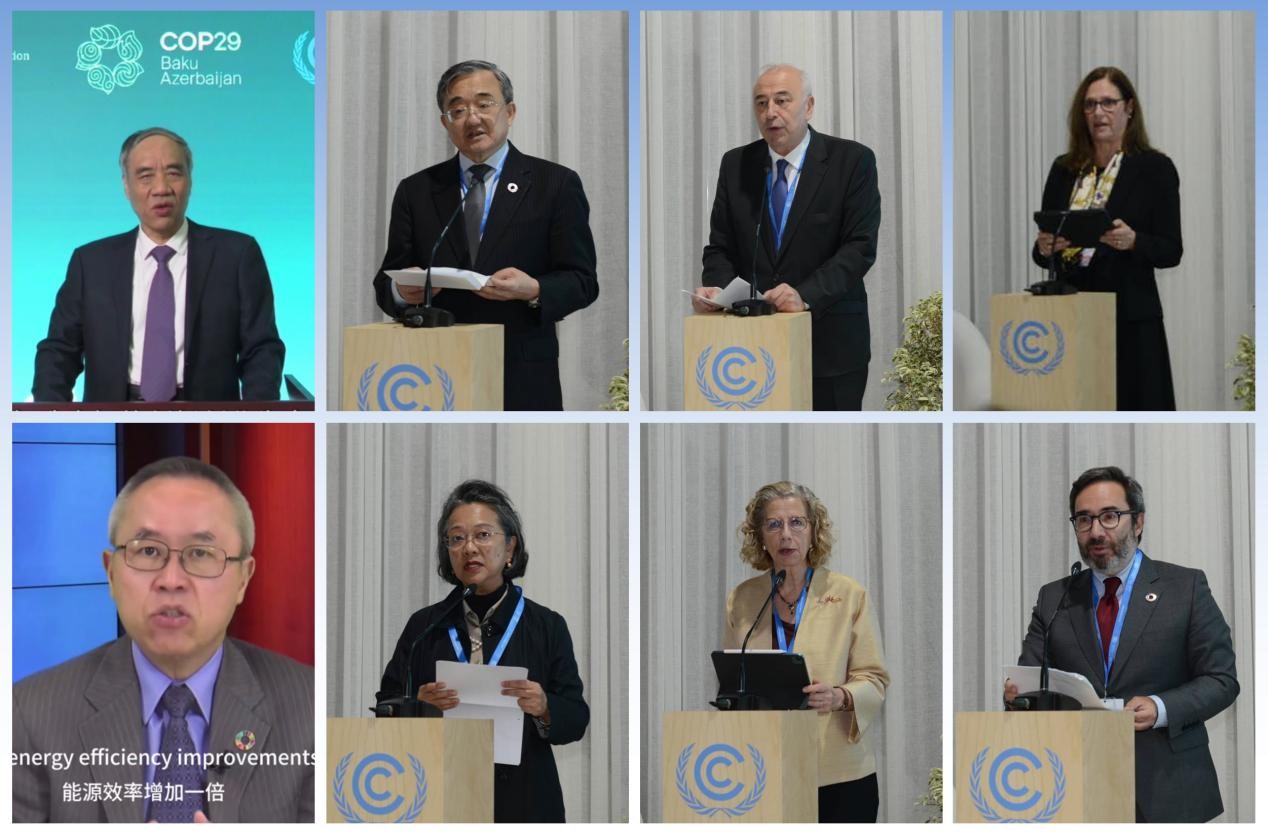
 0 Comment(s)
0 Comment(s) Print
Print E-mail China.org.cn, November 16, 2024
E-mail China.org.cn, November 16, 2024
On Nov. 15, the Energy Theme Day of the 29th Conference of the Parties (COP29) to the UN Framework Convention on Climate Change (UNFCCC) kicked off with its first session in Baku, capital of Azerbaijan.

The event focused on advancing energy transition and achieving the Paris Agreement's temperature control target through a new carbon neutrality scheme under the Global Energy Interconnection (GEI) initiative.
With the theme "Accelerating Global Climate Action through Reliable Renewable Energy Substitution," the event was co-organized by the Global Energy Interconnection Development and Cooperation Organization (GEIDCO), the Ministry of Energy of Azerbaijan, the UNFCCC Secretariat, and the Sustainable Development Solutions Network (SDSN).
The event launched the report Accelerating Global Carbon Neutrality: Reliable New Energy Alternatives based Energy Transition, which for the first time systematically explained the concept of reliable renewable energy substitution and introduced a comprehensive evaluation system for it. The report outlined three development stages for renewable energy: electricity replacement, capacity replacement, and full-scale substitution, providing China's wisdom and solutions for global response to climate change.
Senior representatives from the climate and energy departments of China, Azerbaijan, and Uruguay, along with leaders of international organizations like the United Nations and over 60 guests from more than 40 institutions worldwide, attended the event.

Keynote speakers included Liu Zhenmin, China's special envoy for climate change, Samir Valiev, Azerbaijan's deputy minister of energy, Elisa Facio, minister of industry, energy, and mining of Uruguay, Armida Salsiah Alisjahbana, executive secretary of UNESCAP, Inger Andersen, executive director of UNEP, and Jorge Moreira da Silva, executive director of UNOPS. Professor Gu Shengzu, chief expert of the Global Development Think Tank, and Li Junhua, United Nations under-secretary-general, gave virtual addresses.
Xin Baoan, chairman of GEIDCO and president of the China Electricity Council, noted in his remarks that promoting rapid growth in renewable energy is a complex project involving energy development, allocation, and utilization. He emphasized that factors such as safety, consumption, and cost need to be considered holistically. The GEI vision aims to build a modern energy system that is clean-centered, electricity-focused, interconnected, smart, and efficient. This system seeks to promote clean energy production, electrified consumption, extensive resource allocation, and digital business transformation, presenting a comprehensive and adaptable framework for energy transition.
Xin highlighted three key areas for achieving the exponential growth of renewable energy and building GEI.
First, innovation in renewable energy development is essential, adopting cost-efficient, integrated hydro-wind-solar approaches and unified systems encompassing generation, grid, load, and storage. Such strategies can enhance the scale, quality, and efficiency of renewable energy projects, drawing investment to drive the reliable replacement of fossil fuels.
Second, advancing grid interconnection will support large-scale renewable energy development, enabling resource complementarity across regions and optimizing supply quality and efficiency.
Third, building a resilient energy system is crucial. This includes establishing a robust grid with advanced digital and intelligent technology to enhance climate resilience, operational security, flexibility, and support for renewable energy development and reliable power supply.
In 2023, 133 countries at COP28 reached a consensus on eliminating fossil fuel dependency and introduced an initiative to triple global renewable energy capacity (to 11 TW) by 2030. However, a gap of 3 TW remains, underscoring the urgent need for practical solutions.
The report Accelerating Global Carbon Neutrality: Reliable New Energy Alternatives based Energy Transition introduces "eight typical models" and "six key technologies" tailored to the resource characteristics and development stages of different regions. Leveraging GEIDCO's independently developed global model and database, the report outlines a future energy landscape centered on reliable renewable energy substitution.
As China's first international energy organization, GEIDCO has been actively engaged in the UN Climate Change Conference, hosting thematic events, releasing research findings, and incorporating GEI into the sixth IPCC Assessment Report to contribute to coordinated global energy, climate, and environmental governance. During COP29, GEIDCO will also co-host with the UNFCCC Secretariat a capacity-building event for new type power system, which will focus on advancing global energy transition and climate action. This event will bring together experts and scholars to explore the latest technologies, discuss policy frameworks, and propose innovative solutions for clean energy development and utilization.